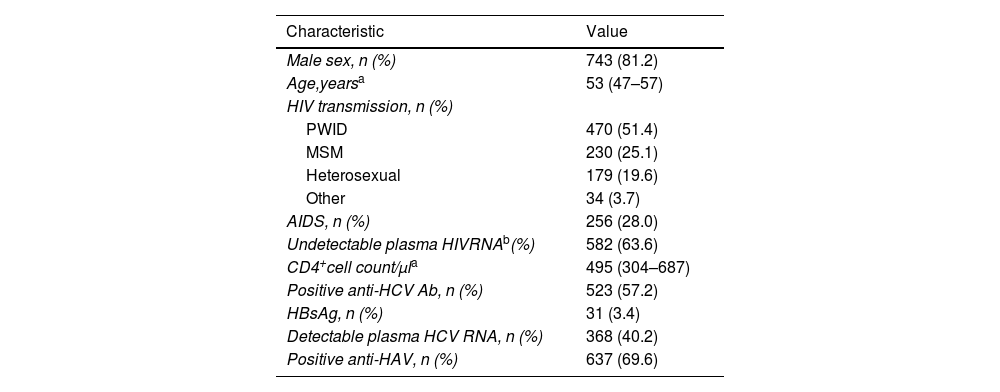Periodic outbreaks of hepatitis A (HAV) infection in men who have sex with men (MSM) have been reported. Low vaccination uptake in HIV-infected individuals could drive new outbreaks. We aimed at evaluating the incidence of and risk factors for HAV infection in people living with HIV (PLWH) in our area. We also assessed the rates of HAV vaccination.
MethodsThis was a prospective cohort study. 915 patients were included, 272 (30%) of them were anti-HAV seronegative at baseline.
ResultsTwenty-six (9.6%) susceptible individuals became infected. Incident cases peaked in 2009–2010 and 2017–2018. Incident HAV infection was independently associated with MSM [adjusted odds ratio (95% confidence ratio): 4.39 (1.35–14.27), p=0.014]. One hundred and five (38.6%) HAV seronegative patients were vaccinated, 21 (20%) of them did not respond, and one (1%) patient lost immunity against HAV. Four (29%) non-responders to vaccination showed incident HAV 5–9 years afterwards.
ConclusionsThe incidence of HAV infection in a cohort of well-controlled PLWH remains low and stable, with intermittent outbreaks involving mainly non-immunized MSM. A significant proportion of PLWH remain susceptible to HAV infection due to insufficient vaccine uptake and limited response to vaccination. Importantly, patients not responding to HAV vaccination continue at risk of infection.
Se han notificado brotes periódicos de infección por hepatitisA (VHA) en hombres que practican sexo con hombres (HSH). La baja tasa de vacunación en personas infectadas por el VIH podría dar lugar a nuevos brotes.
ObjetivoEvaluar la incidencia y los factores de riesgo de la infección por VHA en personas que viven con el VIH (PVVS) en nuestra área. Se evaluaron también las tasas de vacunación frente al VHA.
MétodosEstudio de cohortes prospectivo en el que se incluyeron 915 pacientes, 272 (30%) de los cuales eran seronegativos frente al VHA al inicio del estudio.
ResultadosVeintiséis (9,6%) individuos susceptibles se infectaron. Los casos incidentes alcanzaron su punto máximo en 2009-2010 y en 2017-2018. La infección incidente por VHA se asoció de forma independiente con HSH (odds ratio ajustada [índice de confianza del 95%]: 4,39 [1,35-14,27], p=0,014). Ciento cinco (38,6%) pacientes seronegativos frente al VHA fueron vacunados, 21 (20%) de ellos no respondieron y un paciente (1%) perdió la inmunidad frente al VHA. Cuatro (29%) pacientes que no respondieron a la vacunación presentaron infección por el VHA entre 5 y 9años después.
ConclusionesLa incidencia de la infección por VHA en una cohorte de PVVS bien controlada sigue siendo baja y estable, con brotes intermitentes que afectan principalmente a HSH no inmunizados. Una proporción significativa de PVVS sigue siendo susceptible a la infección por VHA debido a la insuficiente vacunación y a la respuesta limitada a la misma. Es importante destacar que los pacientes que no responden a la vacunación frente al VHA siguen estando en riesgo de infección.
Article
Socio de la Sociedad Española de Enfermedades Infecciosas y Microbiología Clínica

Para acceder a la revista
Es necesario que lo haga desde la zona privada de la web de la SEIMC, clique aquí
Para realizar los cursos formativos
La actividad estará abierta para socios de la SEIMC. IMPORTANTE, recuerde que requiere registro previo gratuito. Empezar aquí











